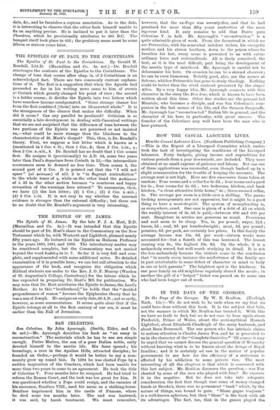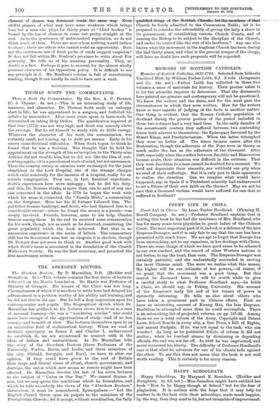IN THE DAYS OF THE GEORGES.
In the Days of the Georges. By W. B. Boulton. (Eveleigh Nash. 15s.)—We do not wish to be rude when we say that we could have done without this book. It is the subject that not the manner in which Mr. Boulton has treated it. With this we have no fault to find, but we do not care to hear again about Frederiek, Prince of Wales, about the semi-mythical Hannah Lightfoot, about Elizabeth Chudleigh of the many husbands, and. about Beau Bramwell. The one person who has intrinsic claims to serious attention is Charles James Fox, and he is presented to us in the character of the" GimpleterGaniesfer.'"of course it may be urged that we cannot discuss the general questorrof Monarchy without knowing what is to be known about the doings of Royal families ; and it is certainly ad rem in the matter of popular government to see how far the efficiency of a statesman is affected by his addiction to some private vice. The most interesting of all the chapters is that which is concerned with this last subject. Mr. Boulton discusses the question,—was Fox cheated by some of the men who played with him? He answers it in the negative. But he does not take into adequate consideration the fact that though vast sums of money changed hands at Brooks's, there was no permanent " bank " which, by the nature of things, was bound to gain. "Blanc ga.g-ne toujours " is a well-known aphorism, but then " blanc" is the bank with all its advantages. The fact, too, that in the games played the element of chalice- wag- dominant- tenths- thee sanienway. -Ever . skilful players of whist may have some weakness which brings loss, but a man who plays for thirty years at "blind hookey " is bound by the law of chances to come out pretty straight at the end. As to the gentlemen of unblemished reputation, we do not think much of them. There are men whom nothing would induce to cheat ; there are others who cannot resist an opportunity. Does not the continuous use of fresh packs of cards suggest suspicion? It does not fall within Mr. Boultou's province to write about Fox generally. He tells us of his amazing personality. That, no doubt, is a fact. Perhaps it goes to account for the almost wholly personal character of his Opposition policy. It is difficult to see any principle in it. Mr. Boulton's volume is full of entertaining reading, though it can hardly be said to have met a want.























































 Previous page
Previous page